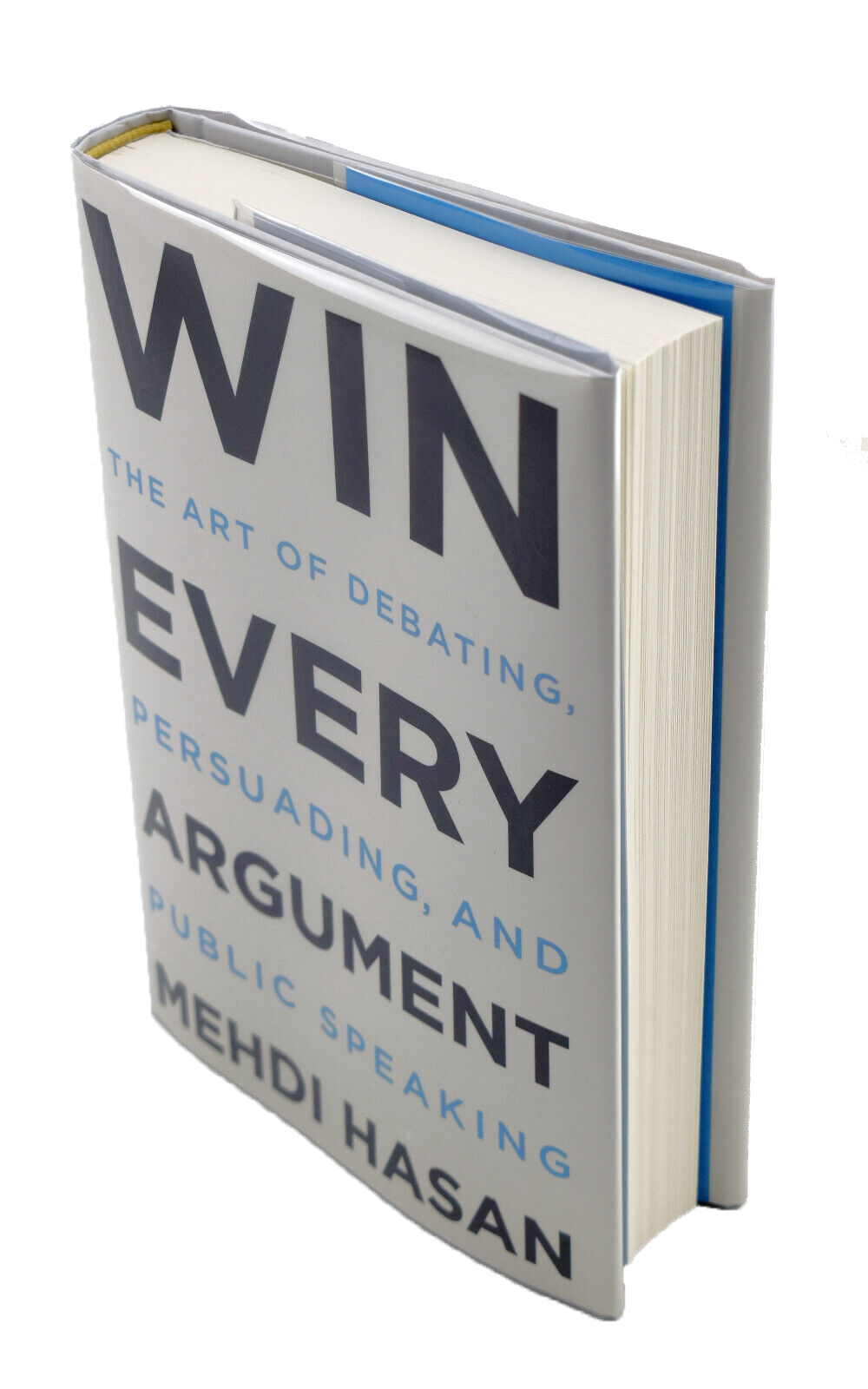BOOK REVIEW: Win Every Argument: The Art of Debating, Persuading and Public Speaking
Mehdi Hasan
2023
Mehdi Hasan is considered one of the most formidable debaters and interviewers. After making a name for himself on both sides of the Atlantic from the BBC’s Question Time to Al Jazeera’s upfront show or currently on his own show on MSNBC. His hard-hitting exchanges with politicians, pundits and policy makers has earned him a reputation on the speaker’s circuit. With two decades of experience in broadcasting Mehdi Hasan in his new book outlines how to win every argument utilising the techniques, experiences and principles he’s developed in his career.
Hasan points out, there is no escaping arguments. Whether on Twitter, in Parliament or at the dinner table, we all feel the very human urge to voice our disagreement. Arguing itself often gets a bad rap and is blamed for everything from political polarisation to marital breakdown. But Hasan contends, debate and argument are the very lifeblood of democracy. They are a means of establishing the truth, of opening our minds to new ideas and of working our way through problems. We just need to get better at them. Taking us from the Greeks to Churchill, from Cicero to Martin Luther King, Tony Blair and Elizabeth Warren, Hasan shows the importance of the art of persuasion throughout history and explains how anyone can all master this vital skill.
Hasan’s book is divided into three parts. In the first part Hassan outlines the principles he has built up through his speaking career which now form his fundamentals. From knowing your audience so you can win them over, to playing the ball, and the man and to feelings, not just facts. According to Hassan, when dealing with people, you’re not dealing with creatures of logic, you are dealing with creatures of emotion. Often we hear “facts don’t care about your feelings.” Facts are facts, but one also needs an approach that goes back millennia; you have to appeal to people’s hearts, not just their heads.
Using the original Star Trek series, where the two main characters on the show: Commander Spock, the ultra logical, uber-rational Vulcan; and Captain Kirk, the red blooded, hot-headed human. Many preparing a speech end up taking Spock’s approach, focusing on facts, stats, and data, when, really, we should be channelling Captain Kirk and making an emotional appeal to our audience.
Hasan litters his book with his personal anecdotes, well publicised interviews and historical moments to illustrate his fundamentals. Hassan also makes use of lots of research into the human mind, psychology and sociology. Hassan found that despite all the research of feelings trumping facts many politicians still don’t fully realise this reality. Right-Wing parties often win because they have a near-monopoly in the marketplace of emotions, whilst the Left continue to naively place their stock in the marketplace of ideas. This drives the Left up a wall, as they cite policy propositions and figures only to lose out on inspiration. But the simple truth is that conservatives across the West know how to rile up and energise their base. For Hassan you have to ensure that you have the goods to reach listeners’ hearts as well as their heads.
How did the wholly unqualified Donald J. Trump, a former reality TV star and failed property developer, defeat sixteen Republican rivals in the race for the 2016 GOP presidential nomination? These weren’t sixteen slouches. They were major figures within the party at the time: senators, governors, business leaders, and even one candidate who was the brother of one former president and son of another former president. Did Trump beat them by outwitting them on the debate stage? By beating them on policy? By raising more money? Or was it by taunting and diminishing them with childish nicknames? Trump’s tactics were almost universally derided in political and media circles. The then presidential candidate was seen as a foul-mouthed outlier, a no-holds-barred controversialist. Hassan however explains Trump’s much-maligned tactics were not that different from those deployed by many orators in human history.
Politicians spend their lives building their credibility, using their credibility to bolster their arguments. Many orators throughout history have launched attacks upon their opponent’s credibility to dent them in arguments. This was something Trump used to his advantage, he played the ball and the man. This is why Trump’s primaries and presidential debates turned into mudslinging matches. Hilary Clinton, who had more experience in government then Trump ever will, couldn’t in the end use this to bolster her credibility as she was spending all the time defending herself (and her husbands) personal credibility.
In the second part of his book, Hasan focuses on the tricks of the trade. From the rules of three to the art of the Zinger to Judo moves to setting booby traps for your opponents. Here he introduces the Gish Galloper. Both Trump’s critics and supporters agree that, when challenged by an opponent or interviewer, this is his technique of choice. Trump became the reigning world heavyweight champion of the Gish Gallop because the former president turned up to debates, interviews, and speeches to issue “…dollops of galactic nonsense delivered in an avalanche of jumbled verbiage, all of which is abandoned without correction or refutation as the next avalanche comes sliding down the hill.” The strategy used by Trump was the one created by the late Duane Tolbert Gish, the biblical evolution-denying biochemist who worked as the vice president of the Institute for Creation Research (ICR). Gish himself made a name for the ICR and Young Earth creationism by winning argument after argument against evolutionists in debate halls across the US in the 1970s and 1980s. His style of debate was one of spewing forth torrents of error that the evolutionist “…hasn’t a prayer of refuting in the format of a debate.” Hasan outlines this is exactly what the Gish Gallop is designed to do in any argument: to leave you gasping for air, sunk in a flood of falsehoods and fabrications, drowned in a deluge of distortions, deflections, and distractions. All of which lands like a true load of bullshit: all at once, with a splat, in a way that’s impossible to clean up without getting dirty.[1]
In the final section of his book, Hasan goes behind the scenes to outline many aspects of public speaking we don’t see. The first of these is the assumption that public speaking is a skill you either have or don’t have, as if those who regularly appear onstage or on TV are winging it and they are natural born speakers. Hassan outlines how he wishes this was true. Hassan explains “When I deliver a ten- or fifteen-minute address at an event, that’s all the audience sees or thinks about. But what they won’t see is how much time went into that speech in the days, weeks, or months prior. Not just to research and write it but also to prepare and practise it, in my head and out loud.”[2] Hassan believes no good speaker or debater tries to make it up as they go along. To succeed, you need to be prepared to talk about the topic at hand and you also need to have practised talking about it. In fact, the most important piece of advice Hasan gives is: Do. Not. Wing. It.
Hassan believes there is no such thing as a natural speaker. He uses two of the greatest English-speaking orators of the past hundred years: Winston Churchill and Martin Luther King Jr to prove his point. Both had to do serious work to become the iconic orators we now know them to be. Churchill’s valet Norman McGowan confirmed he would practise his speeches in the bath, with McGowan often thinking he was being called for. Whilst Martin Luther King Jr had given his historical ‘I have a dream,’ speech, what is not well known is that King had been working with much of the content of that speech in other addresses he gave months and years before the march on Washington. He took the time and opportunity to get very comfortable with his content and experimented with what worked and didn’t work in venues that weren’t as prominent as the National Mall.
Hasan ends his book with how he became good at debating. Hassan worked with ITV’s Jonathan Dimbleby in the early 2000s and that’s what prepared him for his future career. The award-winning journalist, a scion of the Dimbleby broadcasting family, hosted his eponymous political interview show on British television between 1994 and 2006. Every Sunday at lunchtime, he would conduct an hour-long, in-depth interrogation with a top politician, in front of a live studio audience on London’s South Bank. Dimbleby was formidable, one of the most feared and forensic interviewers of that era. Hassan’s job was to help him prepare. Every week, in the run-up to the big Sunday interview, three of them, one producer and two researchers including Hassan, would spend several days digging into the background and record of the confirmed guest: their statements, policies, career highlights and lowlights. For Hassan, despite his two decade career, nothing has had more influence on how he prepared for a public presentation, debate, or interview than the experience working for the Dimbleby show. The experience showed him that if you want to win an argument, nothing is more important than digging in and doing your homework.
Hasan’s book offers an entertaining primer on the techniques for making effective arguments. The examples, history, experiences and research make this a lively book and more than just how to debate and win arguments. The book is an outline of the techniques public speakers and officials use to be effective in the public space. The book also offers simple recommendations that are easy to follow. Hasan’s personal anecdotes, interviews, and historical illustrations show how to apply his recommendations. Hasan bolsters his book with the many interviews and debates with high-ranking political officials from the UK, US and China, to show how to win every argument.
1 Hasan, Mehdi, Win Every Argument: The Art of Debating, Persuading and Public Speaking, pg 150
2 ibid, 191




